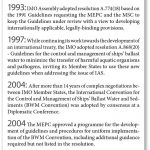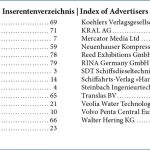At least, the maritime sector finally has a fixed date: The Ballast Water Management Convention will enter into force on 8 September 2017. However, the industry is still facing its biggest challenges in this respect
After Finland has ratified the »International Convention fort he Control and Management of Ship’s Ballast Water and Sediments« now the[ds_preview] combined tonnage of contracting States jumped to 35,1441% with 52 contracting Parties. With this, the official hurdle of a minimum of 30 states, representing 35% of world merchant shipping tonnage was taken.
In the eyes of the International Maritime Organization (IMO) this is a »landmark step towards halting the spread of invasive aquatic species, which can cause havoc for local ecosystems, affect biodiversity and lead to substantial economic loss«. IMO Secretary-General Kitack Lim said, »The entry into force of the Ballast Water Management Convention will not only minimize the risk of invasions by alien species via ballast water, it will also provide a global level playing field for international shipping, providing clear and robust standards for the management of ballast water on ships.«
The Ballast Water Management Convention will require all ships in international trade to manage their ballast water and sediments to certain standards, according to a ship-specific ballast water management plan. All ships will also have to carry a ballast water record book and an International Ballast Water Management Certificate. Most ships will need to install an on-board system to treat ballast water and eliminate unwanted organisms. According to the IMO, more than 60 type-approved systems are already available.
However, this is only one viewpoint. The other one – from the maritime industry – is the criticism that there are still different and very severe standards of the US Coast Guard. Because this problem is still not solved, the entry into force of the Convention triggered some commotion. The international shipping association BIMCO said to be »deeply concerned« that the Convention will enter into force leaving shipowners without treatment systems approved for global use and about »the prospect of the industry having to install treatment systems now which later may not be approved for use in US waters. This is because the US has not yet approved treatment systems that comply to its own, more stringent, national standards.« »Shipping will have to invest significantly in the installation of ballast water treatment systems by next September – only to find the investment is wasted if their system does not meet US standards,« Lars Robert Pederson, Deputy Secretary General said. BIMCO is also concerned that systems approved to the present IMO standards would not be robust enough to ensure their functioning onboard real ships and their performance to the regulatory requirements to treat ballast water. »We therefore call upon IMO to expedite the revision of their G8 guidelines for approval of ballast water treatment systems,« Pederson added.
The shipowners association International Chamber of Shipping (ICS) shares this opinion and reiterates that it is now »more vital than ever that IMO Member States finalise the revision of the G8 Type Approval Guidelines for treatment systems« at the next session of the IMO Marine Environment Protection Committee this October. ICS Chairman, Esben Poulsson said: »We must ensure that shipowners can have absolute confidence that the expensive equipment they will soon have to install will be effective in treating ballast water conditions normally encountered during worldwide operations and be regarded as fully compliant during Port State Control inspections. Unfortunately, the entry into force of the new IMO regime will not resolve the extreme difficulties that still exist in the United States.«
»The shipping industry will be faced with real chaos«
Esben Poulsson, Chairman, ICS
ICS says there is still great uncertainty with respect to the more stringent United States approval regime for treatment equipment, which started to be enforced in January 2014 – the U.S. not being a Party to the IMO Convention).
According to the ICS, the U.S. regulations require all ships that discharge ballast water in U.S. waters to use a treatment system approved by the U.S. Coast Guard. However, because no systems have yet been approved, ships already required to comply with the U.S. regulations have either been granted extensions to the dates for fitting the required treatment systems or else permitted to install a USCG accepted Alternate Management System (AMS), in practice a system type-approved in accordance with the current IMO Guidelines.
»However, an AMS will only be accepted for operation for five years, after which time a fully USCG approved system must be installed. But the US Coastguard does not guarantee that an AMS will be subsequently granted full approval. Hence shipowners that may have installed an AMS in good faith, at a cost of between 1 to 5 mill. $ per ship, might then have to replace the system completely after only five years«, the shipping body criticizes.
Further, the situation had been compounded by the Coast Guard announcing, at the end of last year, that it would not accept the methodology used by other IMO Member States to approve UV treatment systems when assessing the number of viable organisms in treated ballast water. Now, the USCG repeated its strategy, stating that the entry into force of the Convention would not change the approach of the regulations. But the Coast Guard would continue to work with the IMO in order to harmonise the testing procedures.
After all, the regulators can sigh with relief to have their convention coming into force after years of waiting. The industry, still facing huge economic challenges, on the other hand now has another big problem. ICS therefore announced the strategy to work with IMO Member States to impress upon the United States the importance of coming to a »pragmatic solution«. »Otherwise, once the IMO Convention finally enters into force next year, the shipping industry will be faced with real chaos.« said Chairman Esben Poulsson.
Michael Meyer






















